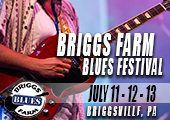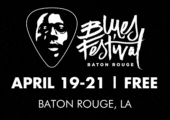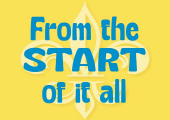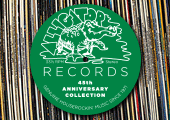CHARLIE MUSSELWHITE
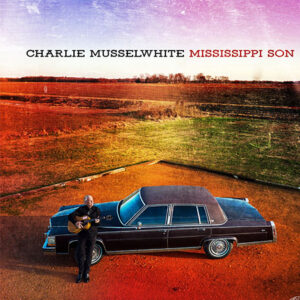 Mississippi Son
Mississippi Son
Alligator Records – ALCD 5009
After more than 40 albums, a Grammy Award, and a Mack Truck full of accolades, awards, and critical acclaim, Charlie Musselwhite hardly requires an introduction to Living Blues readers. He is consistently ranked among the top harmonica players in the LB Readers’ and Critics’ Polls, and just about every other poll under the sun. There is just one thing that many may not know, and after this album it will be a secret no more: the sensitive harmonica virtuoso Charlie Musselwhite also is a fine guitar player.
This writer was admittedly surprised to learn of this when seeing Musselwhite during an eye-opening and unforgettable “Tribute to John Lee Hooker” concert in 1992 at Madison Square Garden, New York City. During that show Musselwhite played solo, with racked harmonica and acoustic guitar, as well as in duos and trios with Bonnie Raitt and Ry Cooder. On this album the musical adventurer lines up his arsenal of harmonicas, but opted to forgo the rack, telling LB, “I play so much better when I’m holding it so I overdubbed the harp. I think I still have the first harp rack I got given to me by Willie Borum in Memphis.” He gets the really deep roots country blues sound out of his 1954 Gibson Silvertone, the kind with a small amp built into the case. He plays through a Laney amp for that rich, earthy and ancient sound, in both straight and Spanish (open G) tuning. On half of the 14 solid tracks, he is joined by the subtle and elegant Ricky “Quicksand” Martin on drums and Barry Bays on acoustic standup bass, who do well to keep the down-home, mellow-down-easy, almost languid feeling that Musselwhite laid down for Mississippi Son. There are no other guitar players on the album, and none are needed. Charlie is all that!
This is a coming-home album of sorts. The Mississippi native recently moved back to the South after many years in places like Chicago and Northern California. On Mississippi Son, he took it all back to the roots, to the real true country blues that so impressed him a as serious young blues appreciator, way back when he started out on Beale Street in Memphis. That was before he expanded musical horizons and took the blues into the realm of jazz, gospel, Tex-Mex, Cuban, and other world music. He explains in the liner notes, “All the tunes I wrote on Mississippi Son are based on things I think about and/or witnessed. They all somehow are extensions of me.”
The release is a triumphant personal journey, an album reminiscent of all the friends and mentors in Musselwhite’s six-decade career. You can hear them all come through in this album, which is excellently produced by his wife, Henri Musselwhite, and Gary Vincent, and recorded at Clarksdale Soundstage in Clarksdale, Mississippi.
Mississippi Son is slow—gentle and heartful instrumentation with powerful, incisive lyrics. The singer whispers in a raspy, melancholy way—almost like he is on the back porch playing and he has to stay quiet enough to not wake up the kids and neighbors. His guitar playing is pure, unadulterated roots blues, and when he adds his signature harmonica playing, always tasteful and fitting, the resulting stirring blues twangs the bass string of your soul.
The covers are as emotive as the strong originals. Yank Rachell would love Musselwhite’s interpretation of Hobo Blues. He refreshes the often-covered Crawling King Snake by John Lee Hooker. You can hear a little of Hooker, Big Joe Williams, and Lightnin’ Hopkins in Musselwhite’s version of Charley Patton’s Pea Vine Blues, and indeed throughout the album. Somehow, the unusual choice of Guy Clark and Robert Mondlock’s Americana/alt-country song The Dark fits in just fine. The real stars on this album are Musselwhite’s very personal songs, like Blues Gave Me a Ride, where he exclaims, “The blues tells the truth in a world full of lies,” which is just one of the many brilliant lyrical lines and nuances in this album. His beautiful instrumental solo guitar tribute Remembering Big Joe at once tips the hat to his old friend and showcases his process as an acoustic guitar picker. Stingaree is a fiery blues with Musselwhite letting loose on the harp and guitar, and declaring, “My baby is a honeybee. She might not sting for you but she’s always buzzing me.”
Professionally, Musselwhite is a giant. Musically, as singer-songwriter and multi-instrumentalist, he is as unpretentious and down-to-earth as it gets. As a person, he is affable, genuine and kind. That’s the only way an artist can pull off an album with this level of sincerity, sweetness, and intimacy, an album that makes you feel as if a friend is playing these songs just for you. It’s another beautiful masterpiece for Musselwhite and it may well rank among his finest work.
Mississippi Son stings the heart with feeling, and not just a little.
—Frank Matheis
VANEESE THOMAS
 Fight the Good Fight
Fight the Good Fight
Blue Heart – BHR 1025
Vaneese Thomas, daughter of legendary Memphis soul man Rufus Thomas, weighs in with her latest—and, characteristically, the result is musically exhilarating and lyrically provocative.
The sound is vintage Memphis, horn-rich, propulsive, full-bodied yet uncluttered, with plenty of eclecticism and stylistic variety (instruments as varied as pedal steel, banjo, and violin make their appearance at various points, and Thomas’ own keyboard work—alternately brooding, churchy, and show-lounge funky—weaves its way throughout). Thomas quite literally comes out swinging in the first cut, Raise the Alarm, an urgency-infused call for social justice; Same Blood Same Bone is a paean to the living legacy of Memphis as a fount of healing, soul-cleansing music, although Thomas is not provincial—she includes a shout-out to “Aretha, Koko, [and] Carla” as among the “sisters in song” who exemplify, and in turn are exemplified by, this legacy. (She might well have included Mavis in her pantheon; both her passion-wracked vocal delivery and the prophetic voice she summons hark back to the Staples in their prime.)
That prophetic register, in fact, is predominant—Thomas, who wrote or co-wrote all of these offerings, makes the personal universal, transforming anecdotal vignettes into parables. The country-tinged Rosalee, spiced by a whip-cracking guitar line from Tash Neal, finds her inhabiting the role of an eldress warning a wayward young woman of the pitfalls and dangers that lie ahead. The protagonist of Bad Man is cast as a teacher and role model for all trapped women desperate to claim independence. He’s a Winner, by contrast, praises a good man, in the process serving as a life lesson for those seeking love. When I’ve Had a Few takes us on a cautionary journey into a hard-drinking barfly’s dark night of the soul; Justin Schipper’s pedal steel solo limns a nightmarish portrait of that soul’s descent. Blue, mystery-drenched and atmospheric, elevates heartbreak to a level approximating existential catastrophe; I’m Movin’ On exemplifies what’s necessary to avoid—or at least redeem—that same catastrophe. The closer, Lost in the Wilderness, finds the hard-traveling visionary, in danger of crumbling, raising a hope-against-hope prayer for succor. But it’s not depressing or self-pitying—like classic gospel songs such as the Mighty Clouds of Joy’s epic I’ve Been in the Storm Too Long, it’s a summons, a call for the weary and wounded to gather together and nurture themselves and one another, in readiness to rise and “Fight the Good Fight” once again.
—David Whiteis
MAVIS STAPLES & LEVON HELM
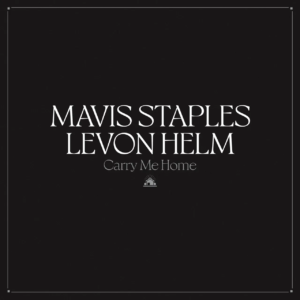 Carry Me Home
Carry Me Home
ANTI- – 87859-2
In 1968 the Staple Singers released their album Soul Folk in Action, which featured a version of the Band’s seminal song The Weight—to the Canadian-American rock ensemble’s delight. Eight years later the Band invited the Staples to perform at their farewell concert at the Winterland Ballroom in San Francisco, filmed by Martin Scorsese for his 1978 documentary The Last Waltz. Unable to attend due to touring obligations, the Staples shot The Weight with them on an MGM soundstage in Culver City, California, a few weeks later. An absolute highlight of the movie, it’s deeply felt and fired with gospel fervor, with Mavis’ whispered “Beautiful!” at the end serving as an apt benediction.
Levon Helm, the Band’s drummer and vocalist, remained close with the Staples family in the years that followed, and in 2011 Mavis Staples traveled to his home in Woodstock, New York, to perform at one of his Midnight Ramble concerts. What no one could know was it would be their final meeting—Helm died the following year after a long battle with throat cancer. Thankfully they recorded this performance, and Carry Me Home serves as both a joyful reunion and a poignant document of their last waltz together.
On this evening Staples and Helm decided to take their audience to church. From Trouble in Mind to You Got to Move, they chose songs with themes of faith, hope, and freedom, and the proceedings take on the feeling of a tent revival. If it’s possible, these songs sound more relevant now than they did a decade ago. Their urgent, forthright takes on I Wish I Knew How It Would Feel to Be Free and the Impressions’ This Is My Country echo loudly in this present moment. The stirring When I Go Away, written by Helm’s bandleader Larry Campbell, and Pops Staples’ haunting This May Be the Last Time speak to a personal as well as a universal sense of loss.
Staples’ and Helm’s bands join forces seamlessly, and the audio evokes the intimate atmosphere of Helm’s Barn studio. Staples’ frayed-velvet vocals are rich and impassioned, cracking with emotion on an a cappella Farther Along, and rattling the rafters on a barnstorming version of Bob Dylan’s gospel anthem Gotta Serve Somebody. Helm leads the proceedings from the drum kit, strong and solid in the pocket as ever. He sings solo only once, on the “Go down Moses” verse of The Weight. Having recovered his voice from the ravages of radiation, his raspy, keening Delta tenor rings out true, to rapturous cheers from the crowd. More than anything, they’re having fun, these two old friends making music, and their delight washes over the audience—and the listener.
Helm’s Rambles were inspired by the traveling medicine shows of his Arkansas youth, and medicine they were, indeed. Anyone who attended one can testify to their jubilant, spirit-lifting quality, and this album bottles that healing feeling at its most potent. Staples and Helm have given us a most welcome gift; Carry Me Home is pure salve for the soul.
—Melanie Young
KENNY NEAL
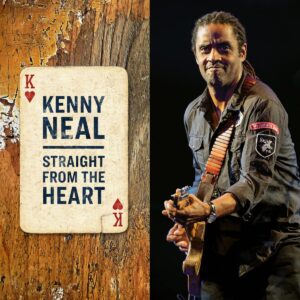 Straight from the Heart
Straight from the Heart
Ruff Records – Ruf 1296
It seems like only yesterday that Baton Rouge guitarist, singer, and harmonica player Kenny Neal first made his mark on the blues scene working first with his brothers as the front man in the Neal Brothers Blues Band and then stepping out on his own with his 1987 debut solo album, Bio on the Bayou (reissued the following year on Alligator as Big News From Baton Rouge!!). With his latest album, Straight from the Heart, Neal proves that he has carried the torch passed to him by his father Raful Neal and stands tall as an elder statesman of Louisiana blues, R&B, and zydeco.
Recorded at his own Brookstown Recording Studios, Straight from the Heart pays homage to Neal’s Louisiana roots, opening with the original Blues Keep Chasing Me, a nod to his dogged pursuit of this music that started when he was performing in his father’s band at age 13. He welcomes another prodigy to the blues fold, as guitarist Christone “Kingfish” Ingram lights a fire on the B.B. King tribute Mount Up on the Wings of the King. Staying in the tribute mode, Neal’s guitar takes over on a cover of the Albert King soul blues classic I’ll Play the Blues for You. Fittingly, he honors his roots with a remake of his father’s 1970 single It’s Been So Long, a swampy R&B ballad that features Neal’s harmonica work.
Neal branches out to zydeco country on two tracks. Joined by second generation players, including Rockin’ Dopsie Jr., Dwayne Dopsie, Anthony Dopsie, and Big Nate Williams, he delivers the slow, blues-infused Louise Ana, evoking Clifton Chenier, and the rollicking Bon Temps Rouler. Looking down river to New Orleans, Neal gives a nod to Fats Domino and Dave Bartholomew as he lays down some swaggering, horn-driven R&B on the original It Don’t Cost Nothing and a cover of Junior Parker’s Someone Somewhere. With the soul blues Two Timing, Neal joins forces with Tito Jackson and his daughter Syreeta Neal on vocals, passing the torch to the next generation. Keeping with the family theme, brother Darnell Neal is featured on bass on the lion’s share of the tracks. Neal was actually born in New Orleans, and he concludes the program with the uplifting second line paean New Orleans. Kenny Neal brings it all back home with Straight from the Heart.
—Robert H. Cataliotti
BIG JACK JOHNSON
 Stripped Down in Memphis
Stripped Down in Memphis
M.C. Records – MC0090
It’s always a celebration when forgotten studio session recordings are uncovered unexpectedly. M.C. Records found these songs in their vault and their discovery is a beautiful addition to the historical record. Nine songs on an album is a bit fewer than normal, but here we can rejoice for the lucky newfound bounty. From 1996 to 2002, Big Jack Johnson recorded four albums for M.C. Records with numerous W.C. Handy nominations. His career in the blues lasted over five decades and this marks his fifth release on M.C. Records.
Stripped Down in Memphis, a posthumously released country blues session by Jack N. Johnson, a.k.a. “Big Jack” Johnson, is a collection of songs taken from two sessions recorded in Memphis. Kim Wilson and Wild Child Butler are special guests on harmonica. The first session was recorded in 1998 with Alabama bluesman Wild Child Butler after M.C. Records reissued his release Lickin’ Gravy in the same year. The second session is unreleased songs from Big Jack’s The Memphis Barbecue Sessions, recorded in 2000 with Kim Wilson on harmonica and released in 2002, an album that earned a W.C. Handy Award for Acoustic Album of the Year.
Late Clarksdale bluesman Big Jack Johnson was a former truck driver also nicknamed “The Oil Man” because he drove for Shell. He is as fierce as ever on acoustic and electric guitars and mandolin. The harmonica aces join Johnson, each without amplification, giving this album a deep, down-home vibe. As the album title implies, this record goes way back to the nitty-gritty blues roots.
This album is stark and unabashedly austere. It’s the real true blues, removing all the unnecessary production adornments, ensuring that the emotional intensity remains intact. The cliché “less is more” comes into play. Without additional sidemen, the sparse instrumentation gives plenty of breathing room for each note to matter, letting the musicians frame each song with a soulful feeling—integral and entirely reflective of itself. There is great beauty in simplicity. In the arts, simplicity puts you in the presence. It’s power and emotive beauty, but it’s no easy feat.
The harmonicists each accentuate without imposing their will. The only surviving member of this session, Kim Wilson, played particularly poignant and fiery, with irrepressible virtuosity and skill, always eloquent. The late Wild Child Butler aptly sings on a few cuts, fitting in just right. It’s hard for anyone to have his harmonica playing juxtaposed on the same album against the iconic Wilson, who could outshine most anyone on the planet if he wanted to. Butler holds his own, in large part because Wilson focused on tasteful, subtle playing rather that cutting showmanship. Wild Child Butler shines brightly on his own heartfelt compositions Aching All Over and See Me Coming, on which he sings and plays harp. Wilson’s perfect interplay with Johnson is a demonstration of restrained, aesthetic playing and tasteful musical communication. These guys understood each other perfectly, with truly refined sensitivity. Take the album opener, the funky version of Jimmy Reed’s standard Baby, What You Want Me to Do, which showcases Johnson’s rhythm guitar prowess. Two rarities impress especially. Bill Doggett’s The Hully Gully Twist again pairs Johnson with Wilson. Johnson gets the mandolin out on Clay Hammond’s Part Time Love, a song that unequivocally assures that Big Jack Johnson was one of the best deep roots performers.
Stripped Down in Memphis is a work of profound, alluring roots blues, true blues at its best. The word “legendary” has been watered down by overuse, misassigned by many publicists and writers. Here the term actually fits perfectly to all three musicians.
—Frank Matheis
ANN PEEBLES & THE HI RHYTHM SECTION
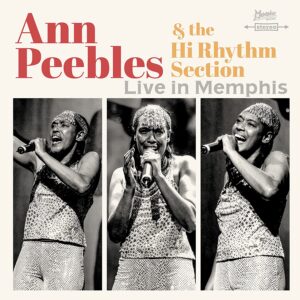 Live in Memphis
Live in Memphis
Memphis International Records – 2038
For fans of southern soul music, this is fundamental. Go directly to your local record store or to your online shopping site and get a copy of Live in Memphis. During the height of singer Ann Peebles’ comeback in 1992 at the landmark Peabody Hotel in downtown Memphis, she reunited with the Hi Rhythm Section that had played on her unforgettable 1970s hits for the Hi Record label—the only time she recorded live with drummer Howard Grimes, bassist Leroy Hodges, guitarist Thomas Bingham, and keyboard player Charles Hodges. They are joined by a horn section consisting of saxophonist John Sangster, trumpeter Anthony Royal, and trombonist Dennis Bates, as well as backup singers David J. Hudson and Tina Crawford. The singing, the musicianship, and the material are all first-rate, and it’s all about performing these songs with the edge that comes from interacting with an enthusiastic live audience.
The nine-song, almost 40-minute set epitomizes the best of funky, rocking southern soul. There’s not much instrumental stretching out; they’re playing the songs that put Peebles in the pantheon of Memphis soul. The program mixes together her big hits with some deep cuts from her albums. Opening with a brief fanfare and introduction of the star, she immediately dives into If I Can’t See You. Peebles then cuts loose on her version of Little Johnny Taylor’s Part Time Love, interpolating snatches of Rosco Gordon’s Just a Little Bit and Willie Dixon’s Spoonful with the band vamping behind her. The longest track and the one outlier from the 1970s is Didn’t We Do It—taken from her 1989 comeback album, Call Me. After a short monologue, Peebles digs into this bittersweet ballad that features an incredibly powerful, emotive call-and-response with Hudson and Crawford. Then the gloves come off as Peebles brings alive a trifecta of hits that explore the cheatin’-in-the-next-room sensuality that is a trademark of the southern soul genre: I Feel Like Breaking Up Somebody’s Home, I’m Gonna Tear Your Playhouse Down, and I Didn’t Take Your Man. The latter is distinguished by the unrelenting backbeat that made the recently deceased Grimes one of the giants of soul music drumming. (You Keep Me) Hangin’ On, a mid-tempo ballad, once again places the spotlight on Peebles’ interaction with Hudson and Crawford. Peebles’ gospel roots come to the fore on her husband Don Bryant’s Let Your Love Light Shine, highlighted by Charles Hodges’ rollicking piano work and Grimes’ funky backbeat. She closes the show with an impassioned version of her greatest hit, I Can’t Stand the Rain. At the conclusion of the song someone shouts, “We got to go,” and the magical night that brought together Ann Peebles and the Hi Rhythm Section for Live in Memphis is over.
—Robert H. Cataliotti
RONNIE EARL AND THE BROADCASTERS
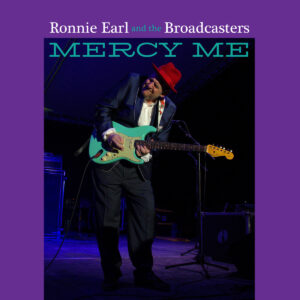 Mercy Me
Mercy Me
Stony Plain – SPCD 1449
Mercy Me is the 26th studio album released by Ronnie Earl and the Broadcasters since 1983. It’s an amazing achievement, and what makes it even more impressive is that the guitarist keeps expanding his musical horizons. While he’s generally regarded as a blues artist—he’s been named “Guitar Player of the Year” four times by the Blues Music Awards—he can just as easily be considered a jazz or R&B player. That versatility is abetted by the current lineup of the Broadcasters that includes Dave Limina on piano and B3 organ; Paul Kochanski on acoustic and electric bass; Diane Blue on vocals; and Forrest Padgett on drums. The band is augmented with some guests who play crucial roles: Anthony Geraci on piano; Mario Perrett on tenor saxophone; Mark Earley on baritone saxophone; and Peter Ward on guitar.
The Mercy Me title evokes the soulful or spiritual orientation that is essential to many of the tracks on the album. Things kick off, however, with a rocking take on Muddy Waters’ Blow Wind Blow with Blue belting out the lead vocal and Geraci, Earl, and Ward working the shuffle groove to maximum effect. The spirituality is evident with the second track, John Coltrane’s iconic Alabama—what an interesting and daring choice of material by Earl. The song was composed to emulate the cadences and tones of Martin Luther King Jr.’s sermon memorializing the four little girls murdered in the 1963 16th Street Baptist Church bombing in Birmingham, Alabama. The droning meditation, originally played by Coltrane’s classic quartet, is powerfully rendered by the interaction between Earl’s guitar, Perrett’s tenor, and Limina’s B3. Soulfulness of a different variety emerges on the appropriately titled Soul Searching. Its opening shimmering single-note guitar runs cushioned by saxophone and organ bring to mind classic southern soul so effectively that it feels as if someone like Brook Benton or Al Green will break into the first verse of the song, yet it’s an instrumental, and Earl’s guitar does all the singing on the track. There are a series of tributes that feature a warm meditative vibe, including Blues for Ruthie Foster, Blues for Duke Robillard, and A Prayer for Tomorrow that brings to mind early Fleetwood Mac (Earl makes a special dedication to “the late great Peter Green” in the liner notes). The selections that feature Blue’s vocals keep things anchored in the blues and soul with covers of Jackie Wilson’s (Your Love Keeps Lifting Me) Higher and Higher, Percy Mayfield’s Please Send Me Someone to Love, Dave Mason’s Only You Know and I Know, and the Earl original The Sun Shines Brightly. Two instrumentals highlight the range the band can cover. Coal Train Blues is a mid-tempo rocking blues dialogue between the two guitarists, and Dave’s Groove is a funky shuffle showcase for Limina’s B3, Earl’s guitar, and Perrett’s tenor. Ronnie Earl and the Broadcasters cover a lot of ground on Mercy Me, and based on their track record, they’re likely already working on something new.
—Robert H. Cataliotti
DEE DEE SIMON
 Dee Dee Simon
Dee Dee Simon
No label – No #
Oakland, California–based chanteuse Dee Dee Simon continues on her self-appointed mission of grafting contemporary southern soul blues storytelling onto a robust, techno-enhanced studio sound resonant with modern-day R&B/hip-hop aesthetics, all employed in the service of her remarkable five-octave voice, which sounds as if it was honed in the pulpit of a sanctified church whose backdoor led directly into an after-hours juke.
Simon penned all the offerings here, and she’s a gifted wordsmith, whether playing the role of a seductive cougar determined to turn a pretty young man out (I Think You’re Ready), advising her sisters that the price to pay for cuckolding other women is to get cuckolded oneself (the lush, Miami-tinged How Does It Feel), proposing a night of lovemaking to set the stage for a hopeful reconciliation between troubled lovers (Lay Up), or offering a testimony of hope and spiritual fortitude (I’m Still Here—that backdoor to the juke opens both ways). Whatcha Workin Wit (Talk Version) finds Simon in full-out show lounge preacher mode as she narrates a street-tough parable of erotic gamesmanship, deceit, and retribution.
As usual with Simon, many LB readers will have to abandon their “authenticity” biases and embrace her songs, the technology used to create them, and the stories they tell, on their own terms. Many of these tracks were produced by Simon’s longtime collaborator Charles “2 Buck Chuck” Boomer, although guest producers Hummin Boy and Tony T Beats also lend their hand in places. The sound is fulsome and roomy, but it’s decidedly New Millennium—programmed beats and synthesized instrumental tracks predominate, and although Simon has proven herself a riveting balladeer in the past, most of what’s here is spiky and up-tempo (no longer an anomaly in an age when nightclub exposure has replaced radio play as a predominant method of breaking a song). But then, no one ever accused Louis Jordan, Wynonie Harris, or Big Mama Thornton of being “tortured blues poets” either, and today they—and many others like them—are revered as essential members of the blues pantheon. This has always been party music, and if you doubt that, re-read Mrs. Annye Anderson’s descriptions of her stepbrother Robert Johnson’s performances in her landmark 2020 memoir, Brother Robert.
As Gil Scott-Heron advised us back in 1976, “The blues has grown.” Dee Dee Simon, who has faced down myriad demons to stay viable and prevail in what is still a cutthroat, treacherous industry, is not about to compromise her aesthetic, her values, or her identity to please anyone but herself, and in that very refusal she shows herself to be carrying on in the spirit of the legendary blueswomen who helped forge the path she now treads.
—David Whiteis
ANTHONY GERACI
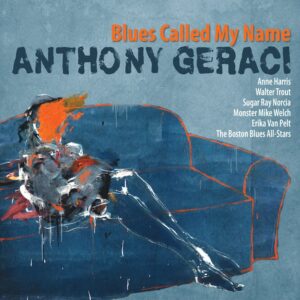 Blues Called My Name
Blues Called My Name
Blue Heart Records – BHR028
A longtime fixture on the New England Blues scene, pianist Anthony Geraci was an original member of Sugar Ray and the Bluetones and Ronnie Earl and the Broadcasters. Whether working as an accompanist or playing on one of his solo albums, Geraci is a master team player. On Blues Called My Name, Geraci and a group of well-chosen musical companions keep the New England blues flame burning brightly.
A song about death may be an unusual way to start an album, but fine ensemble playing and Sugar Ray Norcia’s powerful vocals make That Old Pine Box into a great opening track. Geraci shows his usual finesse on piano and organ, and Charlie O’Neal’s guitar leads add spice. “Monster” Mike Welch, Geraci’s old bandmate from the Bluetones, lends his guitar chops to the title track. Welch’s tone and lyricism are as strong as ever, and he and Geraci play off one another as only old friends can. Traditionalists will love the stripped-down instrumental Boston Stomp. Accompanied only by Paul Loranger on acoustic bass and Jeff Armstrong on drums, Geraci digs deep into his Pinetop Perkins trick bag. The energetic I Go Ooh finds Geraci taking a turn on vocals. His loose, easy delivery is endearing, and John Vanderpool’s greasy sax fattens up the arrangement.
Two of the strongest tracks on Blues Called My Name feature Geraci playing alongside superbly talented guests. Onetime American Idol contestant Erika Van Pelt has performed a variety of pop and rock styles. On Corner of Heartache and Pain, she immerses herself in the blues and makes the most of her dynamic, sultry voice. Geraci’s lowdown, minor-key riffs on piano and organ create the perfect backdrop for the vocal pyrotechnics. On the instrumental Into the Night, Geraci acts as a perfect musical foil for blues rocker Walter Trout. Geraci’s piano weaves itself around every one of Trout’s fiery licks.
It’s great to hear Geraci and his companions doing what they do best. Outstanding performances and a warm feeling of musical comradery make Blues Called My Name a joy from start to finish.
—Jon Kleinman
KEB’ MO’
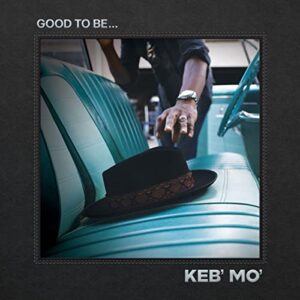 Good to Be . . .
Good to Be . . .
Rounder Records – 1166101542
It’s a refrain we blues lovers have heard forever from the uninitiated. You know how it goes: “The blues ain’t nothing but woe is me all day long,” or “Blues are just too depressing.” Those folks have obviously never heard of Keb’ Mo’.
To say that Keb’ (Kevin Moore) looks at the world sunny side up is like saying Albert King was a decent picker. Since emerging from his native Compton in the ’80s, Keb’ has forged a Grammy-filled career delivering the good news of the blues through a glass-is-half-full outlook and an introspective sensibility that freely explores the depths of southern acoustic blues, country, and soul while also keeping things fresh and modern.
On Good to Be . . ., Moore keeps the good vibes and excellent musicianship flowing over 13 tracks—he wrote or co-wrote 12 of them—touching on topics ranging from the joy of cruising around the old ’hood to taking time to appreciate life’s little blessings to the impact of having a good woman by your side. He’s never in a hurry and would just as soon lose a finger than deliver any filler tracks. He even finds space for a taste of social commentary.
Moore’s acoustic and electric guitar chops are as strong as ever and his buttery smooth voice sounds as strong as it did on his 1994 solo debut, Keb’ Mo’ (he can’t really be 70 can he?). He’s assembled a stellar cast of players for this joy ride, including three members of bass royalty—Nathan East, Marcus Miller, and Victor Wooten—along with Vince Gill, Tom Hambridge, Darius Rucker, Chester Thompson, Kristin Chenoweth, and members of Old Crow Medicine Show.
Moore isn’t opposed to taking nostalgic musical trips, such as the journey through his old neighborhood stomping grounds on the buoyant opener, Good to Be (Home Again), but he proves repeatedly that he’s not one to live in the past. The Medicine Man tackles some thorny topics—“The president lost, but he don’t want to go”—while Louder applauds younger generations for their tenacity as he sings, “A raging silent revolution is rising up all across the land.”
Sophisticated arrangements flavored with lush strings are another Keb’ Mo’ hallmark. He checks that box with the beautiful Marvelous to Me and magical Quiet Moments, where Chenoweth contributes her angelic voice. Not everyone can do justice to a Bill Withers song, but Moore’s ability to inhabit the emotional recesses of any song serve him well on this splendid take on Lean on Me.
As is the case with every Keb’ Mo’ album, I dare anyone to listen to Good to Be . . . and not come away feeling there’s hope in this muddled world after all.
—Rod Evans


